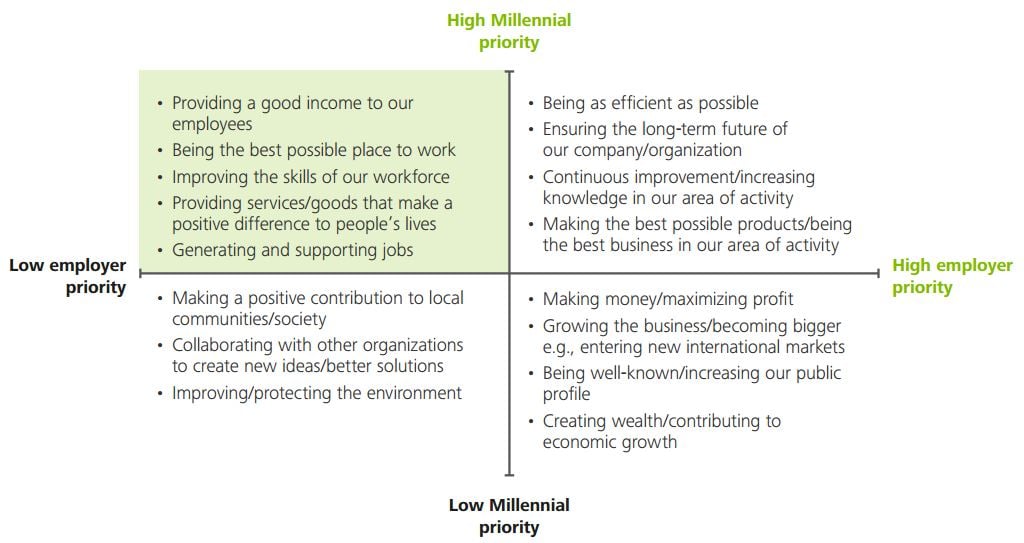How Manufacturers Can Effectively Attract (and Retain) Millennials
Each year Deloitte asks Millennials—the engineers and managers you want to attract and retain—about their expectations at work. With Millennials now comprising the largest share of the workforce, their insight is more critical than ever to businesses that are looking to survive and grow. Millennials don’t just make up new hires either—they are the future leaders that your company will depend on.

Let’s look at a few findings from Deloitte’s survey, and what they mean for manufacturing:
The loyalty problem
Almost half of Millenials surveyed in 2015 intend to leave employers within the next 1 to 2 years, and more will quit before they get their five year pins. While that may help companies recruit Millenials from other employers, it is bad news for retention.
What is different about this generation? Deloitte found that they want more control over their careers, which they show by their willingness to change jobs more often. Millenials also put their own interests before the company’s. Fifty-one percent said their personal goals, ambitions and career advancement influenced decisions, while only around 20 percent said the organization’s formal targets or objectives are their highest priority. They are less focused on their own personal income/reward or short-term financial goals, however, and more interested in the growth and development of their professional and leadership skills.

How to keep Millennials engaged
Millennials become more engaged—and stay longer—in companies with high employee satisfaction levels, and where they experience free and open communication, a feeling of support and acceptance, where ideas from everyone are encouraged. Deloitte’s research found that employee satisfaction levels among Millennials at primarily profit-focused companies was lower. The percentage who intend to stay more than five years at their current company goes down from 27 to 20 percent when they see a “profits before people” culture. They want business priorities to focus on a sense of purpose, including:
- Putting employees first and ensuring skill development as well as sufficient income.
- Establishing a culture of trust and integrity.
- Focusing on the customer and producing good products.
- Environmental stewardship and social responsibility.
This generation does believe that profitability is important, but that it emerges from other business priorities. Millennials are excited by investment that drives growth and new initiatives.
Millennials and manufacturing
Though manufacturing now offers the highly-technical jobs that will attract today’s tech-oriented Millennials, the industry is certainly not exempt from the loyalty problem. According to the ToolingU-SME Millennial Survey, millennial loyalty is still a concern for two-thirds of manufacturers.
So, what can be done? As manufacturing looks to embrace this growing group of workers, a focus on the recruitment training and retention will be key to success. Further, with nearly 70 percent of manufacturers agreeing that Millennials require a new or different management style, bosses may have to revisit their leadership strategies.
Michael Munday, chief executive officer and owner of Arwood Machine Corporation, believes it’s important to keep Millennials engaged and create the fun environment they expect so that they stay. “We want to make sure Millennials are connected to what they are doing,” said Munday. “We do this by making sure they understand how what they are doing fits into the big picture. Our parts are used in missiles and planes and need to be right. We want our millennial workers to feel they are part of an important mission.”
Lastly, Alliance for American Manufacturing President and CEO Scott Paul recently offered tremendous insight on Millennials in manufacturing. “I think it’s incumbent upon manufacturers to de-mystify manufacturing and factory jobs, and to present them in a way that Millennials can appreciate. You see the product of your work every day – which you don’t see with a lot of other occupations.,” said Paul in an article published on www.ien.com.
Karen Wilhelm has worked in the manufacturing industry for 25 years, and blogs at Lean Reflections, which has been named as one of the top ten lean blogs on the web.
- Category:
- Industry
- Manufacturing
Some opinions expressed in this article may be those of a contributing author and not necessarily Gray.